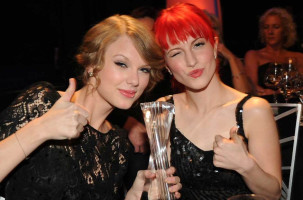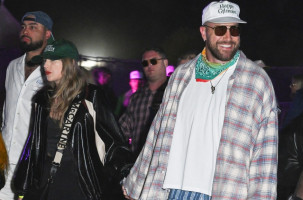After today's tragic passing of Linkin Park’s co-lead singer Chester Benningtonof an apparent suicide, Billboard looked back over the band’s astronomically successful career and remembered a fascinating chapter in the band history, right at the height of their success, when the group went toe-to-toe against one of the most powerful record companies on the planet -- and somehow came out ahead.
The story dates back to April 2005, when Linkin Park, who was then (and still is) signed to Warner Bros. Records, took on its label parent company, the Warner Music Group, which had reportedly asked the band to play at the New York Stock Exchange to “celebrate” the company’s $750 million initial public stock offering.
According to reports, the request incensed the band because the company had reorganized its business in preparation for an IPO by cutting staff and trimming some $250 million in costs. Linkin Park, then two albums in and at the height of their commercial success, believed the belt-tightening would impair WBR’s ability to adequately market and promote their music, which at a time of widespread piracy and plummeting CD sales, meant more than ever. So the band halted the recording of its next album and asked to be released from their contract.
“[This] just exemplifies how out of touch the ownership of the Warner Music Group is with our band," Linkin Park’s guitarist, Brad Delson, told the New York Times. "It doesn't make any sense to us why we would play a show at the New York Stock Exchange. I don't know what was going through their minds."
At the time, WMG’s then-chairman Edgar Bronfman, Jr. called the band, comprised of Chester Bennington, Mike Shinoda, Delson, Joseph Hahn, Rob Bourdon and Dave "Phoenix" Farrell the "biggest rock band in the world.” Having sold over 35 million records worldwide in just five years, and having seen its previous full-length release, 2003's Meteora, move over 10 million copies worldwide, Bronfman's assessment may have been spot-on at the time.
Flattery, however, seemed to have little impact on the band. “[The IPO] is bad news and that's why we don't want to stick around and see what happens," Delson told The Times. "There is no negotiation taking place," he said before adding, "We want off the Warner Music Group."
According to a Billboard report from the time, Linkin Park's camp was said to be seeking a new contract worth $60 million; WMG was offering a five-album deal at $3 million per album ($15 million). Linkin Park also owed four albums on its existing contact.
The talks between the label group and band got so fraught that Linkin Park’s put out a disparaging press release about the situation. In a statement, the band said it was concerned that WMG was unable to live up to its "fiduciary responsibility" to market and promote the band, which at the time was managed by The Firm.
"The new owners of the Warner Music Group will be reaping a windfall of $1.4 billion from their $2.6 billion purchase a mere 18 months ago if their planned IPO moves forward. Linkin Park, their biggest act, will get nothing," the statement read. "Of the planned $750 million raised by an IPO, only about $7 million will be put toward the company's own operations, with no money going to WMG artists."
The back and forth continued in the press when Warner Bros. Records replied in its own statement: "We value our relationship with Linkin Park, and we are proud of our work together since signing the band as a developing artist in 1999. While Linkin Park's talent is without question, the band's management is using fictitious numbers and making baseless charges and inflammatory threats in what is clearly a negotiating tactic. Warner Bros. Records has made significant investments in Linkin Park, and they have always been compensated generously for their outstanding worldwide success."
As far apart as Warner and Linking Park seemed, by December of that year fences were mended and the band had re-signed to WBR, with much improved terms than had been previously on offer. The band reportedly reached a deal with Warner that called for an estimated $15 million advance for the group's next album -- much more than the $15 million total WBR had put on the table over the band's next five LPs -- with an option for up to five more albums, and simultaneously got their royalty rate increased to estimated 20 percent.
In a joint statement, the two sides said the following: "We would like to thank Linkin Park fans worldwide for their continued support. Despite initial concerns after last year's change in ownership, the band is pleased with the direction of the company and in Warner Brothers Records' ability to effectively market their music worldwide under the leadership of Tom Whalley," [WBR’s] chairman.
The agreement between the parties, if nothing else, is testament to the band's massive successes -- and prowess at the negotiating table amid a blinding level of popularity.








